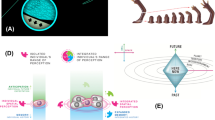Abstract
Information is complicated. It shares its existence with the material world around us. Language has enabled us to describe relationships governing embodied information, without losing the sense of mystery. Newton replaced the soft descriptive touch with the predictive precision of mathematical computation. And action at a distance converted the informational complexity of mechanical interaction into the mathematical tidiness of computational relations over number systems. The paradigm toughened and it was nearly 400 years later that Alan Turing stepped into this scientific setting, and gave it a logical form and that became a catch-all for some, and a reductio ad absurdum for those who failed to matched it to the wider realities of the natural universe. Alan Turing subscribed to both views, and his involvement changed the way we engage with them for ever. This article is an Alan Turing Centenary tracing of part of the story.
Access this chapter
Tax calculation will be finalised at checkout
Purchases are for personal use only
Preview
Unable to display preview. Download preview PDF.
Similar content being viewed by others
References
Brooks, R.: The case for embodied intelligence. In: Cooper, S.B., van Leeuwen, J. (eds.) Alan Turing - His Work and Impact. Elsevier Science (2012)
Calude, C.S., Svozil, K.: Quantum randomness and value indefiniteness. Advanced Science Letters 1, 165–168 (2008)
Cooper, S.: Clockwork or Turing u/universe? - remarks on causal determinism and computability. In: Logic Colloquium 1997: Models and Computability: Invited Papers from Logic Colloquium 1997 - European Meeting of the Association for Symbolic Logic, Leeds (July 1997) (1999)
Cooper, S.: Incomputability, emergence and the Turing universe. In: Carsetti, A. (ed.) Causality, Meaningful Complexity and Embodied Cognition, pp. 135–153. Springer, Heidelberg (2009)
Cooper, S.B.: Definability in the real universe. In: Cooper, S.B., Sorbi, A. (eds.) Computability in Context: Computation and Logic in the Real World. Imperial College Press/World Scientific (2011)
Einstein, A.: Out of My Later Years, vol. 48. Philosophical Library (1950)
Kleene, S.C.: Recursive functionals and quantifiers of finite types i. Trans. of the Amer. Math. Soc. 91, 1–52 (1959)
Kleene, S.C.: Recursive functionals and quantifiers of finite types ii. Trans. of the Amer. Math. Soc. 108, 106–142 (1963)
Post, E.L.: Absolutely unsolvable problems and relatively undecidable propositions: Account of an anticipation. In: Davis, M. (ed.) The Undecidable. Basic Papers on Undecidable Propositions, Unsolvable Problems, and Computable Functions, pp. 340–433. Raven Press, New York (1965)
Smolensky, P.: On the proper treatment of connectionism. Behavioral and Brain Sciences 11, 1–74 (1988)
Teuscher, C.: Turing’s Connectionism. An Investigation of Neural Network Architectures. Springer, London (2002)
Turing, A.M.: On computable numbers with an application to the Entscheidungsproblem. Proc. London Math. Soc. 42(3), 230–265 (1936); A correction 43,44–546
Turing, A.M.: Systems of logic based on ordinals. Proc. London Math. Soc. 45(3), 161–228 (1939)
Turing, A.M.: Computing machinery and intelligence. Mind 59, 433–460 (1950)
Turing, A.M.: The chemical basis of morphogenesis. Phil. Trans. of the Royal Society of London. Series B, Biological Sciences 237(641), 37–72 (1952)
Turing, A.M.: Intelligent machinery. In: Ince, D.C. (ed.) Collected Works of A.M. Turing – Mechanical Intelligence. Elsevier Science Publishers (1992)
Author information
Authors and Affiliations
Editor information
Editors and Affiliations
Rights and permissions
Copyright information
© 2012 Springer-Verlag Berlin Heidelberg
About this paper
Cite this paper
Cooper, S.B. (2012). From Turing Machine to Morphogenesis: Forming and Informing Computation. In: Agrawal, M., Cooper, S.B., Li, A. (eds) Theory and Applications of Models of Computation. TAMC 2012. Lecture Notes in Computer Science, vol 7287. Springer, Berlin, Heidelberg. https://doi.org/10.1007/978-3-642-29952-0_2
Download citation
DOI: https://doi.org/10.1007/978-3-642-29952-0_2
Publisher Name: Springer, Berlin, Heidelberg
Print ISBN: 978-3-642-29951-3
Online ISBN: 978-3-642-29952-0
eBook Packages: Computer ScienceComputer Science (R0)




